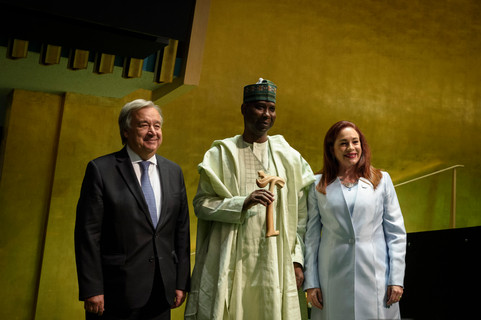INTERVIEW WITH H.E. Pr. TIJJANI MUHAMMAD-BANDE, PRESIDENT OF THE 74th SESSION OF UN GENERAL ASSEMBLY
- AUMISSIONNY
- Sep 14, 2020
- 11 min read
Updated: Sep 15, 2020
As the 74th Session of the UN General Assembly successfully concludes, we sat down with the outgoing President, H.E. Pr. Tijjani Muhammad-Bande to get his reflections on implementing key priorities during his presidency, the evolution of multilateralism, and the place of Africa in the global system.
1. Excellency, as Permanent Representative of Nigeria to the United Nations, you were elected President of the 74th Session of the UN General Assembly by acclamation. As we approach the end of your tenure, what are some of your reflections?
I certainly was humbled by the confidence of my peers in me. They trusted me with the responsibility to shepherd the affairs of the General Assembly during the 74th Session. We experienced a lot of challenges during the session but the camaraderie and support of colleagues was omnipresent, even during challenging negotiations. This, to a large extent, ensured the timely and effective implementation of the priorities of the 74th Session, as well as the fulfillment of the mandates entrusted by Member States to me as the President of the General Assembly.
During the session we had to prepare for the 75th Anniversary of the United Nations and this included intergovernmental negotiations on the Draft Declaration for the commemoration of the 75th anniversary of the UN to be adopted at the UN75 High-level meeting on 21 September 2020. It also included several other important process relating to the three pillars of the United Nations, namely : Human Rights; Peace and Security; and Development.
What I feel right now is gratitude.I feel immensely blessed to have had the opportunity to serve this great Organisation and I hope that we have collectively made a difference during the 74th session. I hope that the good things we have done together will endure.
2. What in your opinion were some of the challenges and opportunities during the implementation of your key priorities, namely quality education, poverty, and inclusion?
On 24 January 2020, I convened an Interactive Dialogue on the International Day of Education, under the theme “Aligning Inclusive Quality Education Policies with Sustainable Development Goals”. The dialogue brought together policy-makers; representatives of teachers’, students’ and youth associations; and as well as participants from the private sector and civil society organizations to discuss the various means of implementing SDG4. The momentum generated by the event galvanized greater international cooperation to ensure inclusive and equitable quality education and promote lifelong learning opportunities for all.
On 12 February 2020, I convened the interactive dialogue on “Targeting Hunger: South-South and Triangular Cooperation for Transforming Agriculture”, with a focus on eradicating hunger.
On 2 March 2020, The President of ECOSOC and I launched the Financial Accountability and Transparency Initiative (FACTI) Panel. The FACTI panel will continue to be operational following the conclusion of the 74th session of the General Assembly, and its work will be essential to the Decade of Recovery to further our goals of eliminating illicit financial flows.
You will recall that the first high-level meeting of the 74th session of the General Assembly was focused on health. In a landmark political declaration on universal health coverage, Heads of State and Government committed to scale up national and global efforts to build a healthier world for all.
An then early this year, the COVID-19 pandemic struck. Communities around the world are now experiencing at a deeper level the message expressed by world leaders in September 2019: that health is an investment in human capital, social and economic development and the empowerment of all people.

As a result of the pandemic we were unable to convene in-person meetings since mid-March 2020. As the world contends with the COVID-19 pandemic, the United Nations remains best placed to galvanize a multilateral response. At the General Assembly, Member States are continuing to tackle a wide range of complex intersectional issues which affect the people we serve. Therefore my priorities became more urgent because of the crisis. Some of our accomplishment during this period include:
- On 30 June 2020, a 40-Member Alliance for Poverty Eradication was established, and the first in an annual series of colloquium on poverty eradication took place under the theme, “Trends, Options and Strategies in Poverty Eradication Across the World”. The Alliance for Poverty Eradication is a group of Member States which are adopting a holistic response to eradicating poverty vis a vis multi-pronged, cross-cutting and coordinated interventions.
- On 9 September 2020, my Office in coordination with the Office of the Secretary-General's Envoy on Youth, convened the Youth Plenary on UN at 75, in accordance with General Assembly Resolution 73/299 on the Commemoration of the 75th anniversary of the United Nations, which emphasized the need to engage young people in all UN75 commemorative activities.
3. In terms of inclusion and being a national of an African State, how did you navigate between reticence and demands for greater representation of Africa in the United Nations system?
We must appreciate that every region of the world is equally important. We must send the message to all that no longer will we have a world in which some regions would dictate to other regions.
Indeed, we need to strive to make the UN system more representative. Even more important , is the need to get young people involved in multilateral efforts towards addressing global challenges. In my view, the youth of the world, far more than my generation, are realizing that inclusion is important.

We need not look further than their drive for social change, social justice and climate action, among many other salient global issues. We have seen how the youth have signed onto this idea of equality of religion and of nations. It is in the same spirit, that in the midst of this pandemic, the priority area of inclusion became even more important.
Education and its enablers are crucial. Technology must be provided to allow full participation of all. We cannot have quality education nor address challenges today while ignoring technology. We need technology to address poverty, which is the number one objective of my presidency.

Inclusion is fundamental. Clearly, segments of any population who are from the beginning excluded tend to suffer the most – the become the poorest segment and the marginalised. The pandemic raised the urgency of elements of the priorities of the 74th Session, and of course, the interconnectedness of the SDGs.
4. Your Presidency was marked by the surge and consequences of the COVID-19 pandemic. How did you manage to push forward your agenda under these difficult circumstances?
The coronavirus has infected millions of the people we serve. Hundreds of thousands of whom succumbed to its effects. This pandemic has exacerbated pre-existing inequalities and the socio-economic impact is unprecedented in the history of our Organization. The World Food Programme predicts a famine ‘of biblical proportions’, UNESCO reports that 1.6 billion children are unable to attend school in person, and the pandemic continues to have a disproportionate effect on women, and vulnerable groups such as people on the move.
Member States have shown commendable leadership by continually working on initiatives at the United Nations to assist developing countries to address the COVID-19 pandemic. As we work to rebuild better after the pandemic, I call on Member States to follow through on their commitments under the Addis Ababa Action Agenda for Financing for Development to build resilience and prevent inequalities from deepening.
Throughout the COVID-19 pandemic the General Assembly worked hard under extraordinary circumstances to implement its mandates, perform essential functions, and ensure business continuity. In light of the restrictions to physical in-person meetings and to ensure the safety of all Delegations and staff, the General Assembly resorted to innovative working methods to enable the Membership to adopt over 70 essential decisions and resolutions via a silence procedure mechanism, mandated by General Assembly decisions 74/544.
In particular, the Fifth Committee adopted the first regular annual budget in more than 40 years and in the Spring adopted innovative working methods to ensure business continuity. The budgets approved by the Fifth Committee had a direct impact on the people we serve, as these provided for peacekeeping operations to continue without halt.

For the first time in the 75-year history of the United Nations, the General Assembly held socially-distanced elections to elect the President of the 75th session of the United Nations General Assembly, the non-permanent members of the Security Council and the Members of ECOSOC.
5. How do you see this scourge impacting the way multilateralism is conducted?
The pandemic exposed the limitations of the United Nations in terms of technology. It also exposed the need to examine the existing rules to see whether we could make adjustments to facilitate conversations and interactions via virtual means. Obviously, the conduct of diplomacy weighted heavily in favour of in-person meetings, and that would always be the preferred approach.

The challenges have strengthened our resolve to work harder together. Since the onset of the COVID-19 pandemic, the World Health Organization (WHO) led the global response. The United Nations system has been most effective in galvanising support for the most vulnerable. In the General Assembly, Member States rallied to adopt GA resolutions which called for solidarity and global access to medicines and medical equipment. It has also taken historic steps to enable the General Assembly to operate and uphold the vital work of the United Nations during this period by adopting decisions under new rules and procedures.
Our continued response will require a re-commitment to multilateralism as we build back better in this Decade of Action and Delivery to implement the Sustainable Development Goals. In 2015, the membership of the General Assembly pledged to leave no one behind and shift the world onto a path of sustainable development and prosperity for all. We are in an unprecedented situation, but it is not impossible. We cannot renege our promise at a time of crisis. This is a call to action for the United Nations as we reflect upon the future we want and the United Nations we need. The adoption of several resolutions by the General Assembly to respond to the pandemic is a worthy achievement.
6. 2020 also marks the 75th anniversary of the UN. An occasion to celebrate the milestones accomplished towards peace, security, and development. What changes are still needed in order to fully adapt the functioning of the UN to current realities, especially for developing countries?

The ongoing COVID-19 pandemic has resulted in both a public health crisis and an economic and social crisis. It is bringing to light vulnerabilities and fragilities of our systems and institutions. The fault lines of rising debt risks, eroding faith in multilateralism and rampant inequality are being amplified by COVID-19.
The most vulnerable countries face financial constraints, lack the fiscal space and capacity to cope with the crisis. Developing countries are also hardest hit by the global economic repercussions of the crisis, including due to a slump in commodity prices and a reversal of financing flows. At the same time, rising debt levels severely limit country’s ability to provide essential public services such as healthcare and social protection.
We must also advance steps to provide debt relief for countries. These approaches must be comprehensive and go beyond traditional debt to include all sources of debt. Donors need to redouble their efforts to meet their commitments on ODA. Additional concessional finance must be made available to enable countries to scale up the health response and provide social protection. The pandemic can only be overcome if it is defeated everywhere.
Our recovery efforts and actions to achieve the SDGs must be aligned. We must continue to pursue sustainable development, as we address the effects of the pandemic. For this we need staunch political will and steadfast international cooperation. I call on all partners to prioritize recovery actions that have the greatest impact on people and advance sustainable development. There cannot be a better future without a strong multilateral response to the crisis. We must take this opportunity to recover stronger, in line with the 2030 Agenda.
7. This year, we commemorate the 25th anniversary of the Fourth World Conference on Women and adoption of the Beijing Declaration and Platform for Action. How can the UN successfully move from discussions into action to accelerate gender equality and the empowerment of all women and girls?
After its adoption, 25 years ago, the Beijing Declaration and Platform for Action remains the most comprehensive and transformative global agenda for the achievement of gender equality. We have made some progress. There are more girls in school than ever before, and between the years 2000 – 2017 the global maternal fatality rate declined by 38%.
However, in efforts to prevent the spread of COVID-19 schools have closed and essential resources for women’s health have been redirected towards the pandemic response. Moreover, women have been disproportionately burdened by a significant uptick in unpaid care work and the rates of gender-based violence have risen at an alarming rate.

Indeed, we cannot implement the 2030 Agenda for Sustainable Development as a whole if we do not achieve gender equality. As we begin the Decade of Action and Delivery to implement the SDGs we must re-commit to the targets of SDG 5 to build a more equal, just, peaceful, and sustainable world for all. We must therefore recommit to this ideal and make it a reality.
8. How do you see the future of the AU-UN partnership and how can we build on achieving our share development goals as articulated under Agendas 2030 and 2063 particularly for the well-being of all African citizens?
There have been progressively more qualitative engagements of a substantive nature in relation to alignment of Agendas 2063 and 2030, and financing is key. As we see the remarkable work UNECA is doing related to focusing on substantive issues, as well as the Africa Development Bank whose contributions have positive implications in different areas.
The Peace and Security element in terms of partnership between African Union and the Security Council, and the UN more broadly, is important.
The fact that we have a highly regarded office focusing on Africa in the UN and advising the Secretary-General, in addition to a very high-ranking official at the level of Under Secretary-General representing the UN in Addis indicate that subsidiarity is taken seriously, especially in relation to development and peacekeeping efforts.
There is of course a need for continued improvement of that relationship in terms of substance.
9. September is Africa Amnesty month. How would you describe the leadership of Africa in establishing peace on the continent?

The idea of silencing the Guns is a very important one. No African and no friend of Africa wishes the continuation of the present reality where Security Council discussions are dominated by African issues, especially because of the conflicts in the continent. However, Africa is and has always been united. Our strength is in our unity. We need to focus on this unity to get the critical capacities to address conflicts. To this end, prevention is key.
10.What would you like your Presidency to be remembered for?
This is an interesting question. From the onset my Office set out to work diligently on the mandates and the priorities which we campaigned on. Because all these were issues that were priority areas for Africa and the world. The priories focused on the implementation of the SDGs and the 2030 Agenda, thereby complementing Agenda 2063 of the African Union.

I just want to note that it’s a Presidency that was fully supported by the continent of Africa, from the beginning to the end. Our efforts focused on working with all Member States within the context of mutual respect and comradery to achieve our common purposes, whether in normal or abnormal times. The objective has always remained the same: to deliver for the world.
What I will remember most about the 74th session is the resilience and commitment of Member States to work together even under extraordinarily difficult consitions to achieve results for the collective good. The UN is made up of many different countries with often divergent interests, yet when it matters its membership is able to overcome all odds for the common good. This continued goodwill will ensure that the Assembly, as the most representative voice of humanity, remains a force for good as well as a reliable partner in the service service of the three enduring pillars of the United Nations, viz: Human Rights; Peace and Security; and Development.
It has been a privilege to serve as the President of the 74th session of the General Assembly. I am confident that we will succeed in reaching the targets set out in the 2030 Agenda for Sustainable Development if we continue to strive together to deliver for all.
Photos Credit:
AU Mission to the UN
OPGA/Geremew Tigabu
United Nations






















